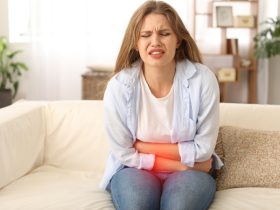Hormonal imbalances occur when there’s too much or too little of a hormone in the bloodstream. The symptoms vary depending on which hormone is affected and the person’s biological sex. Common signs include changes in weight, a decrease in sexual desire, and the development of acne.
Hormones are chemicals produced by glands in the endocrine system. They travel in the blood, conveying messages to organs about what they should do and when to do it. Hormones play a vital role in regulating most major bodily functions, so an imbalance can impact various processes. Hormones regulate:
- metabolism
- blood sugar
- growth
- blood pressure
- reproductive cycles and sexual function
- overall growth and development
- mood and stress levels
Imbalances in hormones like insulin, steroids, growth hormones, and adrenaline can affect both males and females. Females may also experience imbalances in estrogen and progesterone levels, while males are more prone to imbalances in testosterone levels. For more details about hormonal imbalances, read further here.
Identifying Symptoms
Symptoms of a hormonal imbalance can differ based on which gland is affected and whether the person is male or female.
Symptoms in Females
In women, common symptoms include:
- mood swings
- constipation
- irregular menstrual cycles
- infertility
- abdominal or back pain during menstruation
- low sexual desire
- insomnia
- unexplained weight gain or loss
- brittle bones
- excessive hair growth
- skin rashes
Symptoms in Males
For males with low testosterone levels, typical symptoms include:
- reduced sex drive
- erectile dysfunction
- loss of muscle mass
- thinning hair and less hair growth
- chest tenderness
Acne
Acne arises when the skin’s sebaceous glands produce too much oil. This excess oil can block pores and attract bacteria that worsen skin inflammation. The hormones testosterone, estrogen, and progesterone can impact these sebaceous glands in the skin. Here’s how these hormones can contribute to acne:
Testosterone regulates oil production. Excessive levels can potentially clog pores, leading to acne. Rising progesterone levels might influence pregnancy-related acne, though the exact connection isn’t clear. Post-menopausal women may experience acne due to changes in estrogen and progesterone levels.
Moreover, women with polycystic ovary syndrome (PCOS) are more likely to have persistent and severe acne. It’s believed that increased exposure to androgen hormones like testosterone, along with insulin hormone resistance, could heighten acne risks. To find out more about acne linked to hormones, read here.
Gaining Weight
Hormone imbalances can impact various bodily processes, contributing to weight gain. Here are some examples:
- Thyroid hormones regulate metabolism and energy burning. Too few thyroid hormones can slow metabolism and lead to weight gain.
- Reduced estrogen levels in menopause can cause weight gain.
- PCOS-related hormonal imbalances can lead to weight gain.
- Over 80% of Cushing’s disease patients experience weight gain due to excess cortisol production.
Treating the underlying condition can ideally reduce weight gain associated with hormonal imbalance.
Getting Pregnant
Pregnancy results in changing hormone levels to nourish a growing fetus. These include changing levels of the hormones progesterone, estrogen, and testosterone. While the hormone levels may be different, they are not necessarily unbalanced during pregnancy. However, some hormones that increase during pregnancy can affect how a woman’s body uses insulin. This can lead to insulin resistance and diabetes during pregnancy.
Hair loss
Male pattern hair loss has links to reduced androgen hormones such as testosterone. For this reason, doctors also called male pattern hair loss androgenetic alopecia. This condition causes hair loss in the front and crown of the head.
However, not all males experience androgenetic alopecia even though their hormone levels change as they age. Doctors interpret this to mean that some men are genetically predisposed to hair loss.
Hormone Imbalance Tests
The tests used to detect hormonal imbalances depend on the suspected cause of your condition. Some common tests include:
- Blood Tests: Doctors can check hormones like estrogen, testosterone, or thyroid hormone levels through blood tests.
- Imaging: Imaging studies like ultrasound, X-ray, or MRI can identify cysts or tumors causing excessive hormone production.
- Urine Tests: Urine tests measure hormones linked to the menstrual cycle, such as follicle-stimulating hormone (FSH).
- At-Home Testing: Some companies offer at-home testing kits for urine or blood samples. Make sure the company is trustworthy and uses certified labs for accurate results.
Causes of Hormonal Imbalance
Hormonal imbalances are natural at certain life stages, but they can also happen due to issues with the endocrine glands. Endocrine glands are cells that make, store, and release hormones into the blood. They’re spread throughout the body and manage various organs, such as the:
- adrenal glands
- gonads (testes and ovaries)
- pineal gland
- pituitary gland
- hypothalamus gland
- thyroid and parathyroid glands
- pancreatic islets
Certain medical conditions affect these glands, and lifestyle and environment also matter.
Medical Conditions
Conditions affecting hormone production include but are not limited to:
- diabetes (insufficient insulin)
- hyperthyroidism (overactive thyroid) and hypothyroidism (underactive thyroid)
- Addison’s disease (low adrenal hormone production)
- Cushing’s syndrome (excessive adrenal hormone production)
- acromegaly (too much growth hormone)
- hyperglycemia (excess glucagon)
- hypoglycemia (extra insulin)
- solitary thyroid nodules
- pituitary tumors
- benign growths and cysts affecting endocrine glands
- congenital adrenal hyperplasia (low cortisol)
- endocrine-related cancers
- chemotherapy and radiationiodine deficiency (causing goiters)
- hereditary pancreatitis
- Turner syndrome (females with one X chromosome)
- Prader-Willi syndrome
- anorexia
- pituitary gland bleeding or congenital issues in pregnant people and their fetuses
Other Causes of Hormonal Imbalance
There are various other factors that can lead to hormonal imbalance, such as:
- Chronic stress
- Poor diet and nutrition
- Being overweight
- Hormonal replacement or birth control medications
- Misuse of anabolic steroid medications
- Exposure to toxins, pollutants, and chemicals that disrupt the endocrine system, like pesticides and herbicides
Women experience several phases of hormonal imbalance naturally during their lives:
- Puberty
- Menstruation
- Pregnancy, childbirth, and breastfeeding
- Perimenopause, menopause, and postmenopause
- Because women have different endocrine organs and cycles, they are prone to different hormonal imbalance disorders than men.
Causes of Hormonal Imbalance in Women:
- Polycystic ovary syndrome (PCOS)
- Hormone replacement or birth control medications
- Primary ovarian insufficiency (POI)
- Ovarian cancer
Similarly, men go through natural periods of hormonal imbalance during their lives, including:
- Puberty
- Aging
- Stress
Because men have different endocrine organs and cycles, they may experience distinct hormonal imbalances compared to women.
Medical Conditions Leading to Hormonal Imbalance in Men:
- Congenital problems or other underlying medical conditions
- Prostate cancer, influenced by androgens (male sex hormones)
- Hypogonadism (low testosterone production)
- Testicular injury
- Radiation or chemotherapy
- Hormone disorders like pituitary tumors
- Diseases such as type 2 diabetes, HIV, and AIDS
- Genetic conditions like Klinefelter syndrome, hemochromatosis, or Kallmann syndrome
How to Address a Hormonal Imbalance
The treatment for hormonal imbalances can vary based on the underlying cause. Different individuals may need different types of treatment for their hormonal imbalances.
Treatment for Females:
- Hormone or Birth Control: For those not trying to conceive, medications containing estrogen and progesterone can help regulate irregular menstrual cycles and symptoms. Birth control options include pills, rings, patches, shots, or intrauterine devices (IUDs).
- Vaginal Estrogen: To combat vaginal dryness from changing estrogen levels, creams, tablets, and rings with estrogen can be directly applied to vaginal tissues.
- Hormone Replacement Medications: Temporarily reduce severe menopause symptoms like hot flashes or night sweats.
- Eflornithine (Vaniqa): Prescription cream to slow excessive facial hair growth.
- Anti-Androgen Medications: Help manage severe acne, excessive hair growth, or hair loss by blocking male-sex hormones.
- Clomiphene (Clomid) and Letrozole (Femara): Stimulate ovulation in those with PCOS trying to conceive. Gonadotropin injections may also increase pregnancy chances.
- Assisted Reproductive Technology (IVF): Used for PCOS-related fertility issues.
Treatment for Males:
- Testosterone Medications: Gels and patches with testosterone can alleviate symptoms of low testosterone conditions like hypogonadism and delayed puberty.
Other Treatment Options:
- Metformin: Helps lower both androgens and blood sugar levels in PCOS and diabetes.
- Levothyroxine: Medications like Synthroid and Levothroid can improve hypothyroidism symptoms.
Natural remedies
People have used natural supplements to treat hormonal imbalances for thousands of years. However, clinical studies have not proven that any natural remedies can treat hormonal imbalances and their causes.
Supplements
Natural supplements commonly used to reduce symptoms of hormonal imbalances include:
- black cohosh, dong quai, red clover, and evening primrose oil for hot flashes caused by menopause
- ginseng for irritability, anxiousness, and sleep disturbances caused by menopause
- ginseng, and maca for ED
Before taking any natural or herbal treatment, a person should check with their doctor to ensure safety and avoid interaction side effects when taking other medications.
Changes in Your Lifestyle
Making certain lifestyle adjustments can potentially help decrease the chances of hormonal imbalances and alleviate their symptoms. Here are some practical steps you can take:
- Maintain a Healthy Weight: Keeping a moderate body weight can be beneficial.
- Follow a Balanced Diet: Consume a nutritious and well-rounded diet.
- Regular Exercise: Engage in consistent physical activity.
- Hygiene Practices: Focus on washing areas with natural oils, like the face, neck, back, and chest.
- Use OTC Acne Products: For minor to moderate acne, try over-the-counter acne washes, rinses, creams, or gels.
- Manage Hot Flash Triggers: Avoid triggers like warm weather and spicy foods to reduce hot flashes.
- Stress Management: Practice techniques like yoga, meditation, or guided visualization.
- Limit Sugary and Processed Foods: Cut back on sugary and refined carbohydrates.
- Prefer Whole Foods: Choose fresh foods over packaged ones.
- Opt for Safe Cookware: Replace non-stick pans with ceramic ones.
- Safe Food Storage: Use glass containers for storing and heating food and drinks.
- Mindful Cleaning Products: Avoid using cleaning items with toxic chemicals, such as bleach.
- Choose Organic Produce: Pick fruits and vegetables free from pesticides or chemicals.
- Avoid Microwaving Plastic: Refrain from microwaving food or drinks in plastic containers.
Looking Ahead
It’s quite normal for almost everyone to go through a couple of instances of hormonal imbalance in their life.
Hormonal imbalances are particularly frequent during puberty, menstruation, pregnancy, menopause, and as we age. However, some individuals might encounter ongoing and irregular hormonal imbalances.
Conditions affecting the endocrine system or its glands can trigger hormone imbalances. But, outside factors like stress or hormone medications can also contribute.
If someone experiences persistent and unexplained symptoms, particularly those causing discomfort, pain, or disruptions in daily life, it’s crucial to consult a doctor for guidance.
















Find Us on Socials